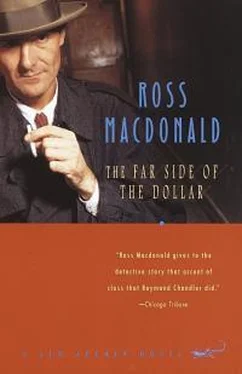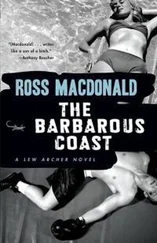“Don’t stand under it,” she said. “I’m always afraid it’s going to fall. I wish you’d have it taken down, Ralph.”
“It was your idea to bring it back and put it there.”
“That was a long time ago,” she said. “I thought the space needed filling.”
“It still does, and it’s still perfectly safe.”
He moved toward her and touched her head. “You’re wet. You shouldn’t have gone out in your condition.”
“I just walked down the drive to see if you were coming. You were gone a long time.”
“I couldn’t help it.”
She took his hand as it slid away from her head, and held it against her breast. “Did you hear anything?”
“We can’t expect to hear anything yet for a while. I made arrangements for the money. Dick Leandro will bring it out later this afternoon. In the meantime we wait for a phone call.”
“It’s hideous, waiting.”
“I know. You should try to think about something else.”
“What else is there?”
“Lots of things.”
I think he tried to name one, and gave up. “Anyway, it isn’t good for you to be sitting out here in the cold hall. You’ll give yourself pneumonia again.”
“People don’t give it to themselves, Ralph.”
“We won’t argue. Come into the sitting room and I’ll make you a drink.”
He remembered me and included me in the invitation, but he didn’t introduce me to his wife. Perhaps he considered me unworthy, or perhaps he wanted to discourage communication between us. Feeling rather left out, I followed them up three tile steps into a smaller room where a fire was burning. Elaine Hillman stood with her back to it. Her husband went to the bar, which was in an alcove decorated with Spanish bullfight posters.
She held out her hand to me. It was ice cold. “I don’t mean to monopolize the heat. Are you a policeman? I thought we weren’t to use them.”
“I’m a private detective. Lew Archer is my name.”
Her husband called from the alcove: “What will you drink, darling?”
“Absinthe.”
“Is that such a good idea?”
“It has wormwood in it, which suits my mood. But I’ll settle for a short Scotch.”
“What about you, Mr. Archer?”
I asked for the same. I needed it. While I rather liked both of the Hillmans, they were getting on my nerves. Their joint handling of their anxiety was almost professional, as if they were actors improvising a tragedy before an audience of one. I don’t mean the anxiety wasn’t sincere. They were close to dying of it.
Hillman came back across the room with three lowball glasses on a tray. He set it down on a long table in front of the fireplace and handed each of us a glass. Then he shook up the wood fire with a poker. Flames hissed up the chimney. Their reflection changed his face for a moment to a red savage mask.
His wife’s face hung like a dead moon over her drink. “Our son is very dear to us, Mr. Archer. Can you help us get him back?”
“I can try. I’m not sure it’s wise to keep the police out of this. I’m only one man, and this isn’t my normal stomping ground.”
“Does that make a difference?”
“I have no informers here.”
“Do you hear him, Ralph?” she said to her crouching husband. “Mr. Archer thinks we should have the police in.”
“I hear him. But it isn’t possible.”
He straightened up with a sigh, as if the whole weight of the house was on his shoulders. “I’m not going to endanger Tom’s life by anything I do.”
“I feel the same way,” she said. “I’m willing to pay through the nose to get him back. What use is money without a son to spend it on?”
That was another phrase that was faintly strange. I was getting the impression that Tom was the center of the household, but a fairly unknown center, like a god they made sacrifices to and expected benefits from, and maybe punishments, too. I was beginning to sympathize with Tom.
“Tell me about him, Mrs. Hillman.”
Some life came up into her dead face. But before she could open her mouth Hillman said: “No. You’re not going to put Elaine through that now.”
“But Tom’s a pretty shadowy figure to me. I’m trying to get some idea of where he might have gone yesterday, how he got tangled up with extortionists.”
“I don’t know where he went,” the woman said.
“Neither do I. If I had,” Hillman said, “I’d have gone to him yesterday.”
“Then I’m going to have to go out and do some legwork. You can let me have a picture, I suppose.”
Hillman went into an adjoining room, twilit behind pulled drapes, where the open top of a grand piano leaned up out of the shadows. He came back with a silver-framed studio photograph of a boy whose features resembled his own. The boy’s dark eyes were rebellious, unless I was projecting my own sense of the household into them. They were also intelligent and imaginative. His mouth was spoiled.
“Can I take this out of the frame? Or if you have a smaller one, it would be better to show around.”
“To show around?”
“That’s what I said, Mr. Hillman. It’s not for my memory book.”
Elaine Hillman said: “I have a smaller one upstairs on my dressing table. I’ll get it.”
“Why don’t I go up with you? It might help if I went through his room.”
“You can look at his room,” Hillman said, “but I don’t want you searching it.”
“Why?”
“I just don’t like the idea. Tom has the right to some privacy, even now.”
The three of us went upstairs, keeping an eye on each other. I wondered what Hillman was afraid I might find, but I hesitated to ask him. While everything seemed to be under control, Hillman could flare up at any moment and order me out of his house.
He stood at the door while I gave the room a quick once-over. It was a front bedroom, very large, furnished with plain chests of drawers and chairs and a table and a bed which all looked hand-finished and expensive. A bright red telephone sat on the bedside table. There were engravings of sailing ships and Audubon prints hung with geometric precision around the walls, Navajo rugs on the floor, and a wool bedspread matching one of them.
I turned to Hillman. “Was he interested in boats and sailing?”
“Not particularly. He used to come out and crew for me occasionally, on the sloop, when I couldn’t get anyone else. Does it matter?”
“I was just wondering if he hung around the harbor much.”
“No. He didn’t.”
“Was he interested in birds?”
“I don’t think so.”
“Who chose the pictures?”
“I did,” Elaine Hillman said from the hallway. “I decorated the room for Tom. He liked it, didn’t he, Ralph?”
Hillman mumbled something. I crossed the room to the deeply set front windows, which overlooked the semicircular driveway. I could see down the wooded slope, across the golf course, all the way to the highway, where cars rolled back and forth like children’s toys out of reach. I could imagine Tom sitting here in the alcove and watching the highway lights at night.
A thick volume of music lay open on the leather seat. I looked at the cover. It was a well-used copy of The Well-Tempered Clavier .
“Did Tom play the piano, Mr. Hillman?”
“Very well. He had ten years of lessons. But then he wanted–” His wife made a small dismayed sound at his shoulder. “Why go into all that?”
“All what?” I said. “Trying to get information out of you people is like getting blood out of a stone.”
“I feel like a bloodless stone,” she said with a little grimace. “This hardly seems the time to rake up old family quarrels.”
“We didn’t quarrel,” her husband said. “It was the one thing Tom and I ever disagreed on. And he went along with me on it. End of subject.”
Читать дальше












